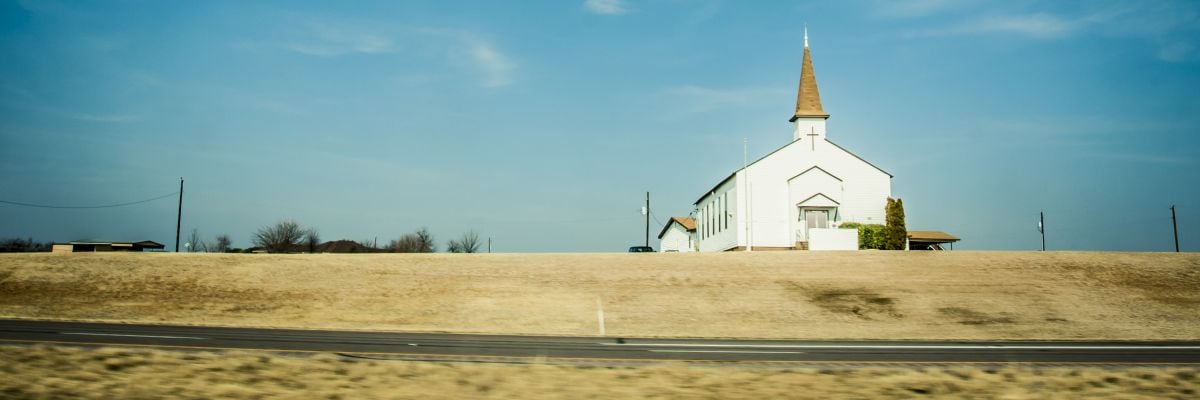
On Easter Sunday morning, my wife and I approached a Catholic priest. If you had known my background, you would have thought we were setting up a punchline: Two Baptists and a priest walk past a confessional . . . The surprising truth is that we wanted to tell him about our interest in Catholicism.
How does a son, grandson, and great-grandson of Southern Baptist preachers come to seek instruction from a Catholic priest? The short answer is: by the working of the Holy Spirit. The longer story begins many years before, in a home where I was taught the supreme value of the truth—even when it’s unpopular. I learned about God’s unconditional grace and love, and I learned to expect God to come near to me. But I was taught not to look for his presence in the Catholic Church.
I pursued God’s nearness through prayer meetings and revivals in Baptist churches, through Puritan theology and biblical commentary, through open worship meetings in Plymouth Brethren-style communities, and through worship at Anglican liturgies. I even read Catholic authors and picked up Catholic prayer books. But eventually, I reconciled myself to my Baptist tradition and happily settled in a Baptist church.
A Different Kind of Sign
My wife, Kristen, and I began our marriage as committed Baptists. Despite preparing for our marriage by reading Humanae Vitae together—uncharacteristic for Baptists—we also began our life together contracepting. Then Kristen experienced a medical crisis that forced us off contraceptives and into natural family planning. After some training, we began to practice NFP and soon found it difficult to imagine our married lives without it. Wanting to learn more, I began to read Pope John Paul II’s Theology of the Body. We found his development of Paul VI’s argument persuasive, but it turned out to have an even more far-reaching influence on our lives than we could have imagined.
The book introduced us to the world of the sacraments. I had always thought of a sacrament as a sign, and so it is. But there are different kinds of signs. A sacramental sign makes the thing it signifies present and available for us. John Paul teaches that the human body signifies the person in this way. We were attracted to the beauty of his description of marriage and the marital act, and we found it made sense of our experience in a compelling way.
But it also made me think about the implications for our relationship with Christ. I soon realized that I was faced with three possibilities: 1) Jesus is not really human, and so does not give himself through his body; 2) he is human but does not intend to give himself to us; or 3) he is human, wants to make a total gift of himself to us, and so gives himself personally through the gift of his body in the Eucharist. The first option I knew to be heretical, and the second option would deprive me of eternal life, since Christ is himself the Life. So I was left with only the third option—an uncomfortable one for a Baptist. But a mind awake is not yet a heart on fire, and so far I hadn’t begun to see the Eucharist as something I couldn’t live without.
The Conversion Seesaw
Soon, however, things came to a crisis point.
The previous spring Kristen had attended a teaching session to become a certified natural family planning instructor. She read Kimberly Hahn’s book on the subject. Curious about her story, she then read the Hahns’ Rome Sweet Home.
At the same time, she was participating in an interdenominational Bible study on Galatians. She was less than satisfied with her study group’s easy dismissal of Catholic views on justification, and, struck by Paul’s assertion that “all that counts is faith working through love,” Kristen came home one day to tell me, “I think we ought to study Catholicism.”
This was unexpected. I had been toying with various arguments and ideas that pointed to Catholicism, and I had discussed them with Kristen. But now there was a very real danger that something might actually happen: My wife tended to act on what she believed to be true.
And so we started a reading campaign. We journeyed together but in a kind of see-saw motion: One would fly ahead while one fell back, and then the positions would change.
Our seesaw finally reached equilibrium when Kristen read a Catholic commentary on John 6. We were struck especially by verse 51: “If anyone eats of this bread, he will live forever. This bread is my flesh, which I will give for the life of the world.” Taken straightforwardly, this verse seems to teach clearly the essence of the Catholic doctrine of transubstantiation.
But we decided to check Evangelical commentaries carefully to see if we had missed some other way of reading this verse. Those commentaries tend to read John 6:51 as metaphorical because, among other reasons, these Protestants believe eternal life is not something one can receive through a physical action.
We were already prepared by the theology of the body, however, to see the physical as capable of the spiritual. John Paul had taught us that something spiritual—the human person—could only be given and received, through its sign, the human body. Having learned that lesson, the eucharistic significance of John 6 leaped out at us.
Though the doctrine of the Real Presence attracted us most strongly, our study had also led us to believe in a great number of other Catholic doctrines. When some of these conclusions were becoming increasingly clear to us, we mentioned our journey to some Catholic friends of ours. They invited us to attend Mass and, after a while, we became regular attendees.
God Is Near Us
At first, we were less than impressed with what seemed a lack of seriousness and enthusiasm among those worshiping with us. But after we began to understand the logic of the Real Presence, we found ourselves paying less attention to the people around us and more attention to the mystery on the altar. That change in focus altered our experience of the Mass. We soon took another important step. If the host really is the body of Christ, then it only made sense to worship him. So we began to go to eucharistic adoration.
Adoration was a powerful experience for both of us. I found there the nearness of God in a way I never had before. He showed me his gentleness, his mercy, and the openness of his Sacred Heart. Kristen found a new intimacy in his presence and a new freedom. We began to see fruit emerging from our times of adoration, both in our personal lives and in our understanding of truths new and old.
At work, I told one of my colleagues that we had begun adoration. “You’re a goner,” he replied with a smile. I tried to protest, but there was something in his comment that I couldn’t deny. We couldn’t imagine ourselves without the sacraments and adoration; following the trail John Paul blazed in his theology of the body, we had arrived at the nearness of God for which our hearts longed.
But some Catholic doctrines still left us nonplussed at best, so after Easter Mass, we stopped the pastor and told him our story. Kristen was thrilled when he offered us private instruction. Since we had come to the truth of the Real Presence, Kristen, despite her hesitations about various Catholic doctrines, longed more and more to communicate in the Eucharist. Now that we were talking to a priest, she finally felt that her longing might be consummated.
Hesitation and Hope
But our seesaw began to wobble again; I shared her excitement, but at the same time felt hesitant. We agreed on the truth of the Real Presence and on the beauty of the Catholic sacramental world. We were completely taken with the truth that, in the sacraments, God touches us individually, and so bodily, to give us his best gift—himself. We recognized in the sacramental economy a picture of a gracious and merciful God coming to meet his children and transform them by his love.
Nevertheless, I began to draw back, thinking of the division our move would create in my extended family and, perhaps, in our relationships with friends and co-workers for whom Catholicism represented an alien, exotic, and somewhat suspect culture. A sense of alienation threatened to overwhelm me. My fears competed with my hopes.
Yet I could not deny the fruit borne by our attendance at Mass and our adoration of the Blessed Sacrament. So we continued our biweekly meetings with the parish pastor, exploring the basic outlines of the Catholic faith and, especially, our remaining difficulties.
After some months of instruction, we began to make preparations for our formal entry into the Church, on the Saturday before Christ the King. Though I knew God was calling us home, I also felt a sense of loss that made my heart hesitate. But a few days before our reception, as I sat in adoration before the Blessed Sacrament, I became aware of the love with which Christ awaited me there. He is always present for me in the tabernacle, I realized, no matter how I might at times forget and wander away from his love. I knew that, most of all, I wanted my children to grow up devoted to this love and mercy, at home in Christ’s eucharistic Heart.
The Shepherd Feeds Us
The priest who received us described our entrance as a “marathon of grace.” My wife and I made our first confession, were confirmed, and made our First Communion, and our children were all baptized. The priest welcomed us with the words of the rite of reception: “The Lord receives you into the Catholic Church. His loving kindness has led you here.” I heard in my mind the words of the psalmist, declaring the loveliness of God’s dwelling place and the happiness of those who live by his altars, where even the sparrow can find a home for her young. But now, kneeling with my family before the Blessed Sacrament, those words rang with a new significance.
The next day, at our first Sunday Mass as Catholics, our hearts were full. We were happy to be in God’s dwelling place, laying our young by his altars, savoring his presence with us, and receiving his gift of himself, body and blood, soul and divinity. We had traveled an unexpected path, marked by many signs of God’s providential care and guidance and culminating at his table. We knew there would be challenges ahead, but we also knew where to find Christ near to us. As a final sign of God’s providential care, the psalm for the day, the 23rd, spoke directly to our hearts. The Lord indeed is our Shepherd, leading us to sustenance and refreshment, freeing us from fear, protecting us from all that threatens us, and setting for us a eucharistic table. Our cup overflows.



